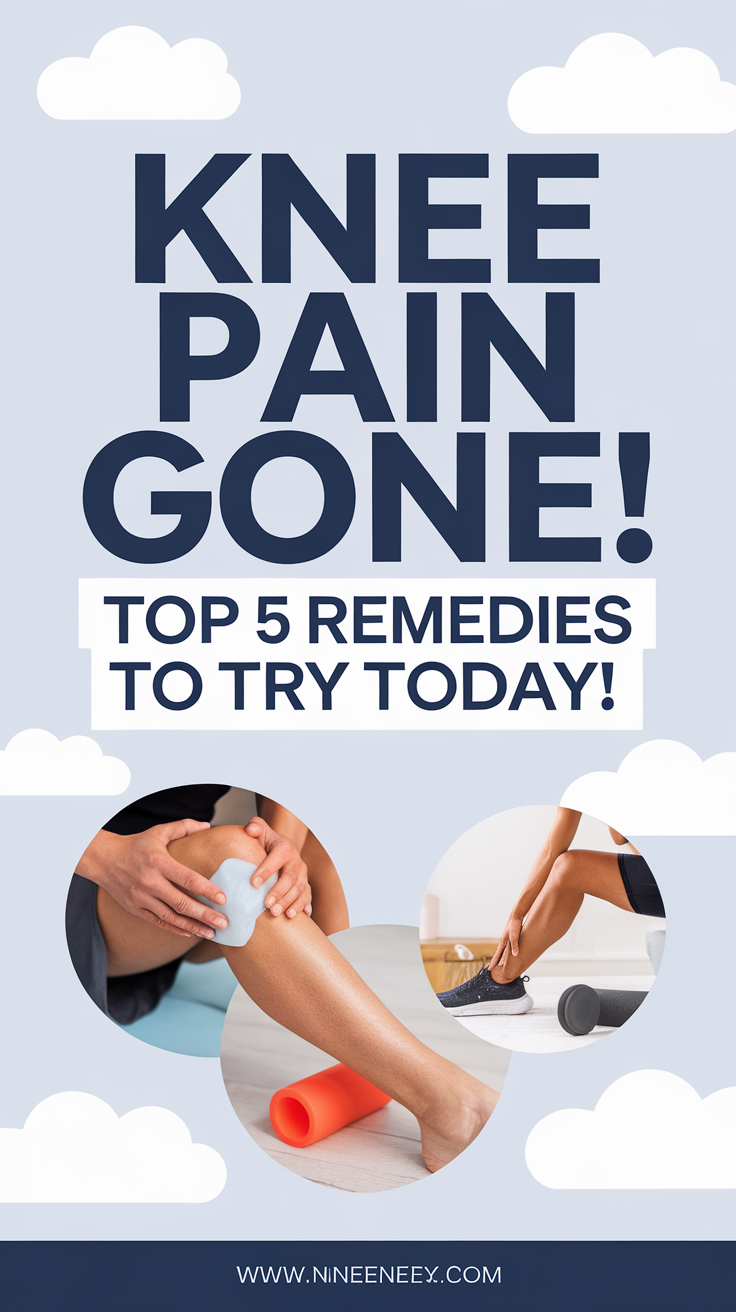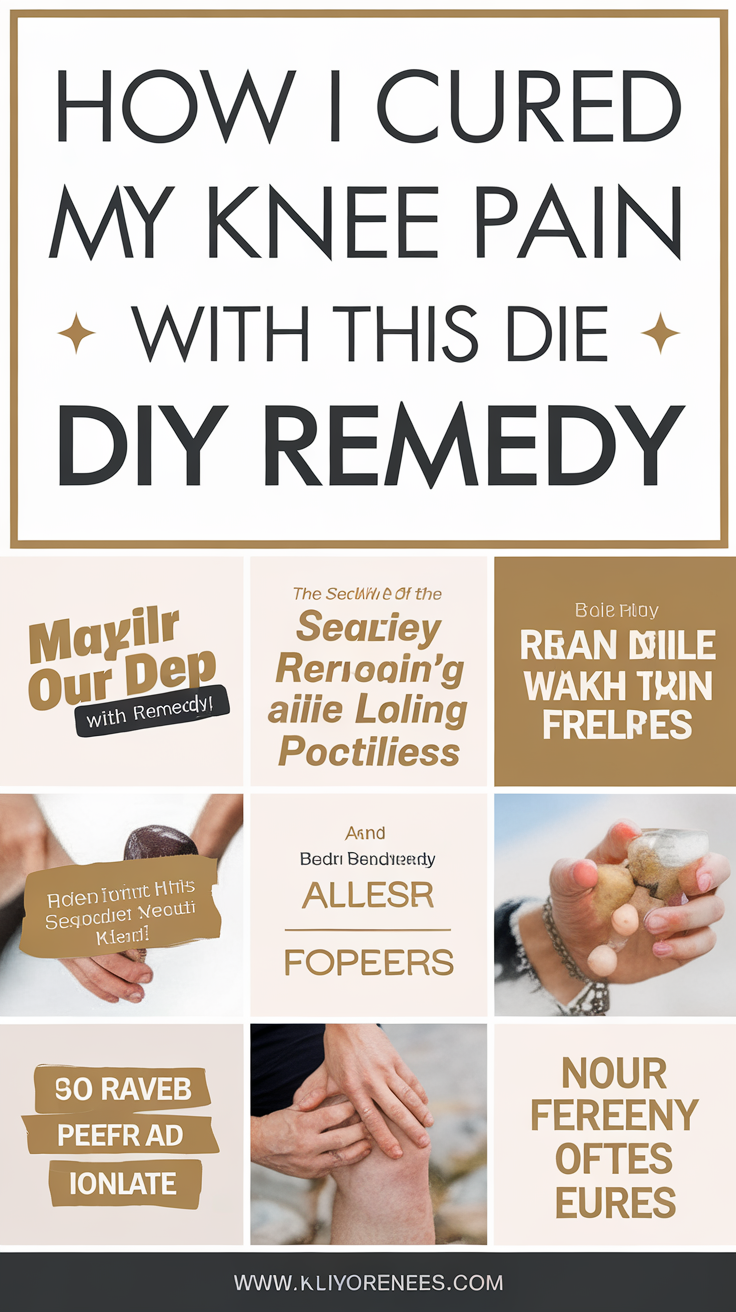Knee Pain Gone! Top 5 Remedies to Try Today!
You can tackle knee pain today with these five easy remedies. First, rest and ice your knee for 15-20 minutes several times daily to reduce swelling. Next, try gentle stretching and strengthening exercises to improve flexibility and stability. Over-the-counter pain relievers like ibuprofen can offer quick relief. Consider natural remedies, too, like turmeric and omega-3s, to fight inflammation from within. Finally, don’t overlook physical therapy, as a professional can create a plan tailored just for you. Want to discover more about how to relieve that knee pain effectively? There’s plenty more to explore!
Rest and Ice Therapy
When you’re dealing with knee pain, taking the time to rest and apply ice can make a significant difference in your recovery.
Resting allows your knee to heal without further strain, so listen to your body and avoid activities that worsen the pain.
Ice therapy, applied for 15-20 minutes several times a day, helps reduce swelling and numbs the area, providing immediate relief.
Make sure to wrap ice in a cloth to prevent skin damage.
Combining these two methods can speed up your healing process and lessen discomfort.
Stretching and Strengthening Exercises
While rest and ice are essential for initial recovery, incorporating stretching and strengthening exercises can greatly enhance your knee’s stability and flexibility.
Start with gentle stretches like hamstring and quadriceps stretches to improve your range of motion. Hold each stretch for at least 30 seconds, and repeat them a few times daily.
Next, focus on strengthening exercises. Simple moves like leg lifts, wall sits, and calf raises can build muscle support around your knee. Aim for two to three sets of 10 to 15 repetitions, gradually increasing as your strength improves.
Always listen to your body; if an exercise causes pain, stop immediately.
Consistency is key—make these exercises a regular part of your routine for the best results.
Over-the-Counter Pain Relief
If you’re looking for quick relief from knee pain, over-the-counter (OTC) pain relievers can be a helpful option.
Nonsteroidal anti-inflammatory drugs (NSAIDs) like ibuprofen and naproxen reduce inflammation and alleviate pain effectively. Acetaminophen is another option that can help manage pain without the anti-inflammatory effects.
Always follow the recommended dosage on the label, and consult your doctor if you have any pre-existing health conditions or take other medications.
It’s crucial to be cautious, as long-term use can lead to side effects like stomach issues or liver damage.
Natural Remedies and Supplements
Natural remedies and supplements can offer a holistic approach to managing knee pain, especially for those seeking alternatives to conventional medications.
Turmeric, known for its anti-inflammatory properties, can be taken as a supplement or added to your meals.
Glucosamine and chondroitin may help support joint health and reduce pain.
Omega-3 fatty acids, found in fish oil, can also combat inflammation.
Additionally, consider using ginger, either in tea or as a supplement, to ease discomfort.
Don’t forget about the power of proper hydration and maintaining a balanced diet rich in antioxidants to support overall joint health.
Always consult your healthcare provider before starting any new treatment to verify it’s safe and effective for you.
Physical Therapy Options
When you’re dealing with knee pain, exploring physical therapy options can be a game-changer for your recovery.
A trained physical therapist can assess your condition and create a personalized plan to strengthen the muscles around your knee. You might engage in exercises that improve flexibility, stability, and overall function.
Manual therapy techniques, like massage or joint mobilization, can also help alleviate pain. Additionally, modalities such as ultrasound or electrical stimulation may be used to reduce inflammation.
Don’t forget to incorporate stretches into your routine to maintain mobility. Regular sessions can help you regain strength and confidence in your knee, allowing you to return to your daily activities pain-free.
Frequently Asked Questions
Can Diet Changes Help Alleviate Knee Pain?
Studies show that nearly 60% of people with knee pain benefit from dietary changes. By incorporating anti-inflammatory foods, you can reduce inflammation and improve joint health, helping you manage and alleviate your knee pain effectively.
When Should I See a Doctor for Knee Pain?
You should see a doctor for knee pain if it’s severe, persistent, or accompanied by swelling, redness, or inability to bear weight. Don’t ignore symptoms that worsen or interfere with your daily activities.
Are There Specific Shoes That Can Reduce Knee Pain?
Yes, specific shoes can help reduce knee pain. Look for supportive footwear with cushioning and proper arch support. Avoid high heels and flat shoes, as they can exacerbate discomfort. Comfort is key to alleviating knee strain.
How Long Does It Take for Remedies to Show Results?
It often depends on the remedy you choose. Some may provide relief within a few days, while others could take weeks. Stay consistent with your approach, and you’ll likely notice improvements over time.
Can Knee Pain Be a Sign of a Serious Condition?
Knee pain’s like a warning light on your car’s dashboard; it’s often a sign something deeper’s wrong. If your pain persists or worsens, it could indicate a serious condition, so don’t ignore those signals.





